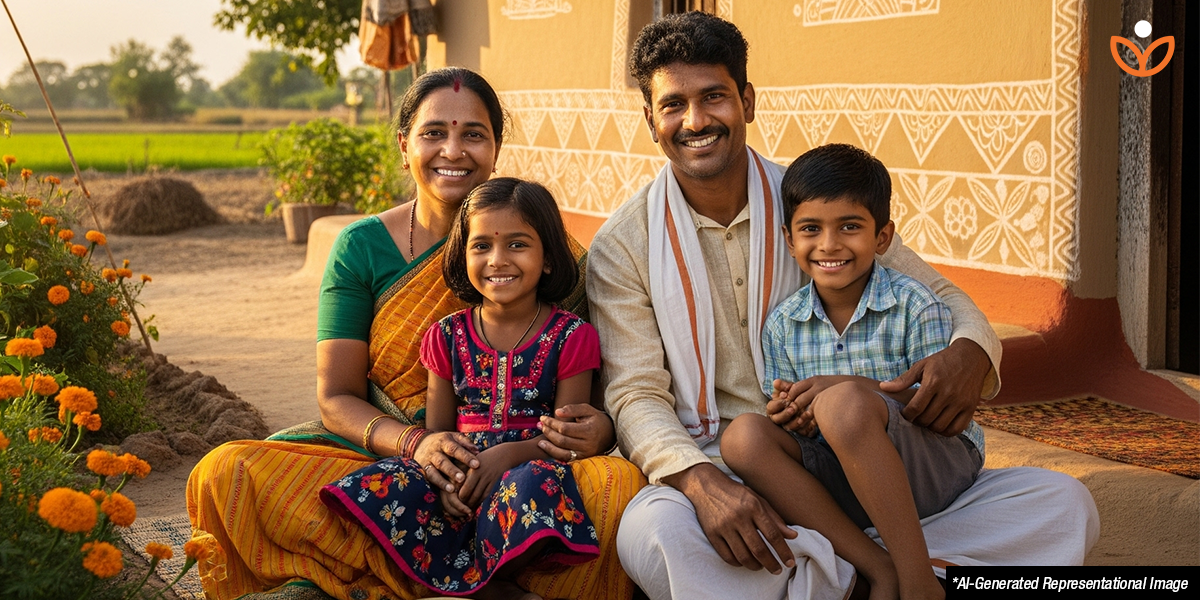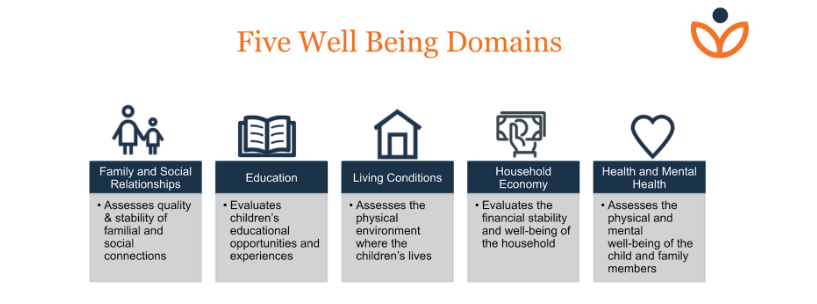
Strengthening Families, One Case at a Time: How Thrive Scale Helps Caseworkers Support Families
What is the first thought that comes to mind, when we think about children entering into institutional care or setup? It is generally related to crises like loneliness, violence, illness, and loss. However, in many cases separation of children from their families is not sudden but is a result of various risks that are not addressed or are ignored over time, poverty, school dropouts, housing insecurity, or health or mental health challenges.
This is where the case management process becomes important. So, what is case management? Case management is a step-by-step process where a trained caseworker or a social worker helps a child and family identify their needs, make an individualised care & support plan, and stay connected to services over time to ensure that children are safe, healthy, and protected within their families. It is not a last-minute rescue plan but a planned and structured ongoing process that prevents separation, strengthens families, and supports safe reintegration of children back to families. This step-by-step journey includes:
- Identifying a child or family at risk
- Assessing their situation across multiple well-being domains
- Designing a care plan in partnership with the family
- Following up consistently over time
- Adjusting interventions based on what works
This approach works in both scenarios where we are preventing a child from entering institutional care and strengthening the family, or supporting a child already in institutional care to return home safely and permanently. Now, in both situations, a simple question that arises is: What exactly does a family need to thrive?
The Thrive Scale™: Translating Needs into Decisions
- At Miracle Foundation India, it is believed that every child deserves to grow up in a safe, stable, and nurturing family and to achieve this, a practical tool is needed that helps case workers and social workers in communities and institutions. One such tool is the Thrive Scale™, which was formerly known as the Home Thrive Scale™. Thrive Scale™ offers a structured and comprehensive framework for ensuring a holistic and effective approach to family strengthening. It helps assess families across five core domains:
The Thrive Scale™ methodology refers to the structured assessment framework, while the ThriveWell App is the digital platform used to apply it in the field. It complements government-mandated tools like the Individual Care Plan (ICP) and Social Investigation Report (SIR) under the Juvenile Justice Act, 2015 and Mission Vatsalya, and does not duplicate the processes. Thrive Scale™ also identifies red flags, recommends interventions, and empowers caseworkers to prioritise interventions and make informed decisions based on the data and evidence.
A Tool for Both Prevention and Reintegration
The design of Thrive Thrive Scale™ tool makes it equally effective in preventing the separation of children and strengthening families and also reintegration of children from institutions back to families.
- For prevention, this tool will help caseworkers and community protection committees in identifying early signs of risk, like school dropout, health neglect, or unsafe living conditions, and will allow them to act early by connecting families to the right support, before separation becomes a last resort.
- For reintegration, the tool provides a structured way to assess family readiness, track improvements, and ensure that children returning from institutional care are supported long after placement and not just at the moment of reunification.
The Thrive Scale™ is designed in such a way that it can be used by trained frontline workers like VCPC members, ASHAs, Anganwadi workers, and Panchayat representatives. The members from DCPUs and CWCs can keep oversight of the whole process. As such, this is not a one-time tool but it is applied at every phase of case management from assessment, planning, implementation, follow-up, and until the case is safely closed.
Reintegration as a Journey: Riya’s Story
A real-life case documented by Audria Choudhury in her research paper illustrates how structured case management using the Thrive Scale™ framework supports long-term reintegration. Riya (name changed) )was separated from her family for over a year and placed in a Child Care Institution (CCI). When contact was re-established, the Thrive Scale™ assessment showed her home had strengths but at the same time there were also some risks. Intervention plans were developed collaboratively, including linking her mother to a tailoring course and providing education support for Riya.
Even after reintegration, regular follow-ups using the Thrive Scale™ helped track the family’s wellbeing. When COVID-19 hit and the mother lost her job again, the tool helped flag the drop in household economy and triggered a second round of support. Today, Riya is thriving at home, and the case is closed only after sustained improvement across all domains.
Case Management: The Bridge Between Families and Support
Effective case management is not just a checklist but it’s a roadmap and a commitment to be with families through both challenges and growth. It helps ensure that no child falls through the cracks, whether they are at risk of separation or returning home after time in care. Through consistent assessment, joint planning, and ongoing follow-up, case management enables field workers to:
- Identify risks before they escalate into separation
- Track progress and adapt interventions over time
- Keep the child and family’s voice at the center of every decision
And, tools like the Thrive Scale™ simply make this process easier to structure, document, and act upon.
Author: Audria Choudhury , Program Impact Manager – Miracle Foundation
Disclaimer: This blog draws on insights from “Home Thrive Scale™ – Case Management Tool Towards Preventing Family Separation and Ensuring Children Thrive in Family-Based and Alternative Care Options” by Audria Choudhury, published in ‘Institutionalized Children: Explorations and Beyond (ICEB)’, 2021. The tool described in the paper, now evolved into the ThriveWell App, continues to be used across Miracle’s programs and in partnership with state-level child protection system and is helping child protection functionaries (both the leadership and frontline case workers) across India, to work more effectively through a structured, child-centered case management process.
The views expressed in the article are the author’s and do not necessarily reflect those of Miracle Foundation India.

